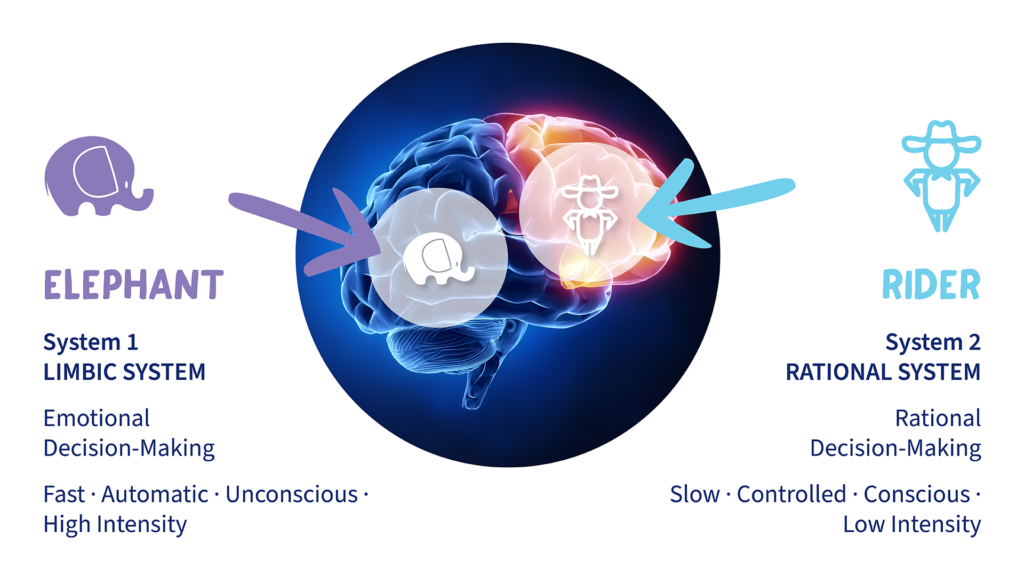What are Core Beliefs?
Core Beliefs are deep-seated perceptions, stored within the brain’s emotional system, that impact how we think, feel and behave.
They can influence everything we do, from the type of car we buy and the sort of house we live in through to the partner we choose and how we raise our children. Our Core Beliefs significantly impact our work life, influencing every decision we make in whatever role we fulfil. This book explains the formation of Core Beliefs and how to use them to improve your leadership impact and presence.
Core Beliefs codify the emotional system within the brain, which works in tandem with the brain’s rational system to help us make decisions and navigate the world.
Although neuroscience is helping us get clearer on how these two systems work together, many great philosophers, leaders and writers have noticed the challenges that the emotional system can pose to our sense of ourselves as rational decision-makers.

Two systems in our brain
As Chip and Dan Heath eloquently say in their book Switch (2010), “In the past few decades, psychologists have learned a lot about these two systems, but of course mankind has always been aware of the tension”.
Plato, for example, said that in our heads we have a rational charioteer who has to rein in an unruly horse that “barely yields to horsewhip and goad combined.” Freud wrote about the selfish ‘id’ and the conscientious ‘superego’ (as well as the ego, which mediated between them). More recently, behavioural economists have dubbed the two systems the ‘Doer’ and the ‘Planner’ (or System 1 and 2, respectively).
But of all these metaphors, to us, the tension between these two systems is captured best by an analogy used by University of Virginia psychologist Jonathan Haidt in his book The Happiness Hypothesis. Haidt says that our emotional side is an Elephant and our rational side is its Rider. Perched atop the Elephant, the Rider holds the reins and seems to be the leader.
But, at a fraction of the size of the Elephant, the Rider’s control is precarious at best.
When the six-ton Elephant and Rider disagree about which direction to go, most Riders lose the battle of wills. They are completely overmatched by the Elephant.
Most of us are all too familiar with situations in which our Elephant overpowers our Rider. You’ve experienced this if you’ve ever slept in, overeaten, dialled up an ex-partner at midnight, procrastinated, tried to quit smoking and failed, skipped the gym, gotten angry and said something you regretted, abandoned your Spanish or piano lessons, refused to speak up in a meeting because you were scared, and so on.
Interestingly, the Elephant’s hunger for instant gratification drives our ability to make quick decisions, but these decisions can come at the cost of accuracy as they are based on past experience and immediate wants rather than the current situation and your aspirational values.
This is in stark contrast to the Rider’s strength, which includes the ability to think long-term, to plan, to prioritise beyond the moment (all the things that your pet Elephant can’t do).
What Elephant do you have?
Fill out our Core Belief Profiler below to discover your Elephant.
Further Information
If you are interested in exploring your leadership style further, please contact us here
